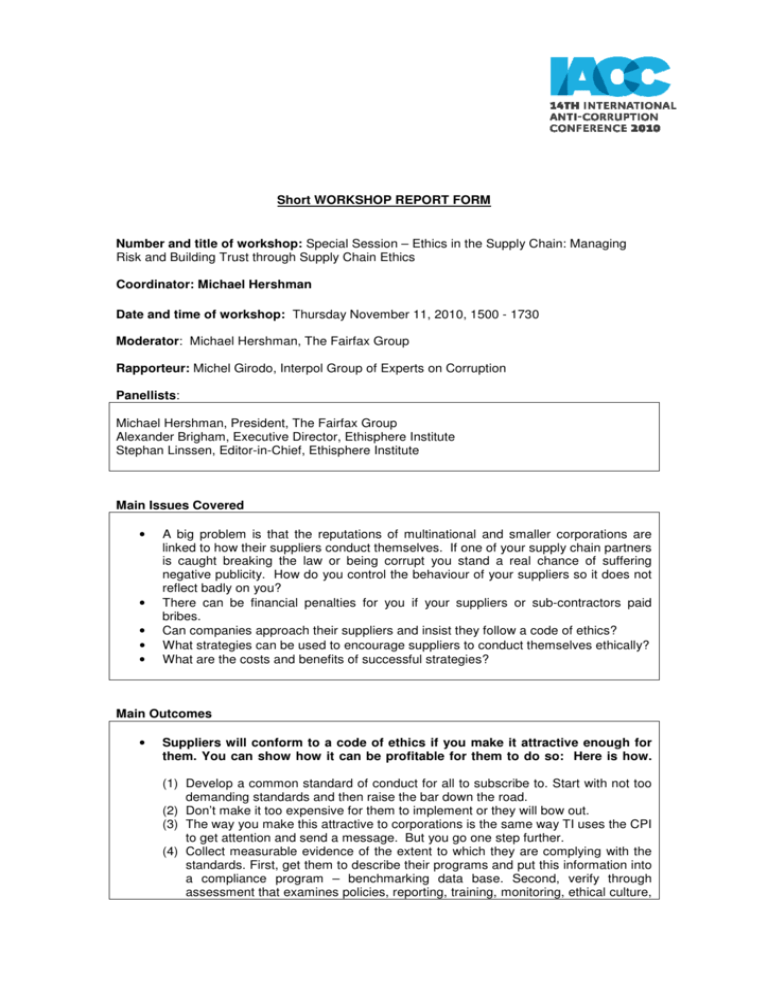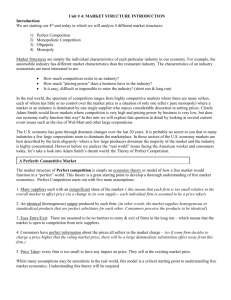Special Session – Ethics In The Supply Chain Short Report
advertisement

Short WORKSHOP REPORT FORM Number and title of workshop: Special Session – Ethics in the Supply Chain: Managing Risk and Building Trust through Supply Chain Ethics Coordinator: Michael Hershman Date and time of workshop: Thursday November 11, 2010, 1500 - 1730 Moderator: Michael Hershman, The Fairfax Group Rapporteur: Michel Girodo, Interpol Group of Experts on Corruption Panellists: Michael Hershman, President, The Fairfax Group Alexander Brigham, Executive Director, Ethisphere Institute Stephan Linssen, Editor-in-Chief, Ethisphere Institute Main Issues Covered • • • • • A big problem is that the reputations of multinational and smaller corporations are linked to how their suppliers conduct themselves. If one of your supply chain partners is caught breaking the law or being corrupt you stand a real chance of suffering negative publicity. How do you control the behaviour of your suppliers so it does not reflect badly on you? There can be financial penalties for you if your suppliers or sub-contractors paid bribes. Can companies approach their suppliers and insist they follow a code of ethics? What strategies can be used to encourage suppliers to conduct themselves ethically? What are the costs and benefits of successful strategies? Main Outcomes • Suppliers will conform to a code of ethics if you make it attractive enough for them. You can show how it can be profitable for them to do so: Here is how. (1) Develop a common standard of conduct for all to subscribe to. Start with not too demanding standards and then raise the bar down the road. (2) Don’t make it too expensive for them to implement or they will bow out. (3) The way you make this attractive to corporations is the same way TI uses the CPI to get attention and send a message. But you go one step further. (4) Collect measurable evidence of the extent to which they are complying with the standards. First, get them to describe their programs and put this information into a compliance program – benchmarking data base. Second, verify through assessment that examines policies, reporting, training, monitoring, ethical culture, leadership etc that we know are linked to detecting and preventing bribery and corruption. Third, arrange your findings in the form of ratings received, rankings with other corporations. Fourth, publish your findings widely and award certifications, logos and designations in three classes: (I) World Class programs (limited); (II) Industry Leading Programs, and (III) Best Practices in Anti-corruption Programs. • What evidence is there to indicate this type of initiative can work? • The Ethisphere Institute, - a well recognized name in business ethics and anti-corruption has collected benchmarking data on more than 2,000 corporations around the world. • The Ethisphere Institute publishes reports, rankings, and findings from verifications in a quarterly magazine sent to more than 30,000 subscribers. • This appears also in the Daily GRC Digest with more than 65,000 readers. Everyone, large and small corporations, suppliers, and competitors alike can see where they stand in relation to everyone else on the index and the World’ Most Ethical corporations. • In a study of the profits earned by the World’s Most Ethical (WME) businesses from 2005 to 2010, we see that this index is a stronger contributor to profits than is your ranking on the S&P 500 or the FTSE 100. • Conclusions • By measuring the extent to which corporations and businesses comply with anti-corruption standards for prevention corruption you have a very powerful tool with which to influence behaviour. • By publishing the results of the verifications and providing labels to categories and rankings you invite a comparison process which stimulates a desire to get out of the low ranks if you are there, and if you are already grouped with industry leaders, to drive you to comply further with the standards and achieve world-class standing with your program. • Voluntary regimes for self and peer assessments are growing very rapidly in numerous areas of work. Peers and social pressure around complying with “soft laws” can have considerable impact on behaviour. Main Outputs • • • The topic and the manner in which the workshop was led facilitated considerable discussion and well thought-out remarks and interventions among many of the more than 70 participants. Input was provided by participants from a variety of countries and indicated that the problems faced around supply chain ethics were comparable. The notion of trust and how to cultivate it was often brought up. Cultivating good relationships with partners and suppliers is facilitated by enlightened leaders in businesses that look at vendors and stakeholders in the supply chain as one big family. Recommendations, Follow-up Actions While external communication strategies are essential to make this strategy effective, several interveners believed having a good internal strategy for communicating ethics and for implementing the standards was just as essential. It was suggested that the actions of “whistleblowers” may signal the very fact that your company has failed in implementing standards and communicating violations using internal avenues for reporting. Part of this internal communication strategy should include a shift in language from developing a “tone at the top” to communicating actual ethical acts and tough decisions made by the Chief Executive. Behaviours speak louder than words. Workshop Highlights (including interesting quotes) “Trust but Verify” Michel Girodo Nov 12, 2010







